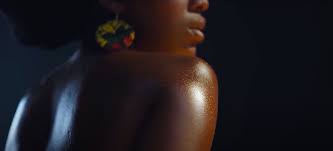What it means to be Dark-skinned in Nollywood

Netflix’s documentary, Skin, produced by Beverly Naya and directed by Daniel Etim Effiong, was recently released and it shone a light into the Industry for viewers and upcoming acts.
Whether you like it or not, we have all been unknowingly conditioned to prefer being light-skinned to being dark-skinned. This awful conditioning is also heavily in place in Nollywood.
Skin, the documentary, shone a light into what happens when you love yourself and appreciate your color. It also shows us that even Nollywood, its film makers, cinematography, lighting, actors, and actresses, are also found wanting when you think of dark-skinned equality.
You and I have seen the rise in the careers of light-skinned actors and actresses faster than those that are dark-skinned. This makes us wonder, is it that they are more talented than their dark-skinned co-stars? Or are we just conditioned to prefer them over the others?
History of Colorism in film
According to Mudi Yahaya, a visual artist and film maker, how the film stock is approached when applied to people of a darker skin tone is a challenge. Different film stocks are now present but Kodak set up the basis by which color film was developed.
What this means is that the film cards Kodak used to develop a color theme for different skin tones was based on a white lady. As you know, the colors that flatter a Caucasian don’t do justice to Africans. This was how colorism started.
A simple historical overview brought this into a closer perspective.
When pictures of prospective brides were sent out to African men, light-skinned ladies were chosen more than the darker-skinned ladies. This was because the film flattered the lighter-skinned as opposed to the dark-skinned.
This, in turn, began the divide in Africans, making us think that lighter skinned Africans are more refined, exotic, and eye-pleasing than dark-skinned Africans.
Quite simple but brings a lot to light.
Color in film making
When you think about color in film making, you don’t think much of it, but what you need to know is this.
How the light bounces off a light-skinned person isn’t the same way for a dark-skinned person.
What this means is that a single film cannot be used to film a light-skinned and dark-skinned person with the same level of result. The film will need to be changed to one that will flatter the dark-skinned person.
It might seem like a lot of work for ignorant film and lighting crew members and makers who will prefer to just not cast dark-skinned actors because of the amount of work it may take to film them in a more flattering way.
Diana Yekini, an actress, who suddenly quit Nollywood said about the industry that
“…you could be fabulous, you could kill it, you could be what they want secretly but if you are not fair, that’s it.”
She also said “…you think you need just talent, but it’s way bigger than that.” She was also told by a lighting crew member on set that “oh, if you’re not light-skinned by 2018, I promise you, you won’t be working.”
In an industry where new actors are encouraged to audition for roles, why do they have to be disqualified by their color of skin?
Are we trying to say that only films made with light-skinned actors are more successful? Imagine what will happen if this much energy was put into making darker-skinned actors more flattering during film making. The sky will only be the limit.
How does this affect actors in Nollywood
This is pretty simple. What this means is that for every six new actors, 3 light and dark-skinned actors each, the lighter-skinned actors have a much higher chance of hitting stardom.
What this means for dark-skinned actors in Nollywood is that they have to work twice as hard to gain the success of their peers and three times harder to be offered a lead role in the industry.
It also means that light-skinned actors have more chances to be cast in a lead role than their darker colleagues.
You would have noticed that when a new face is on the screen, the story was written by the actor which is why they were cast in the lead role.This is probably the reason why most dark-skinned actors own the film they play the lead character in.
Does this mean if you haven’t scrapped the bottom of the pan, you won’t he able to make it in Nollywood? Talent truly gets you a foot in the door, but there are so many other man-made things keeping you from stardom.
Nollywood film makers and producers should know that pasting a black is beautiful slogan or using the #blackbeauty or #melaninpopping shouldn’t be only on their social media pages. It should be put into practice.
If we, as Africans, won’t give Africans a chance, then are we really a continent?















